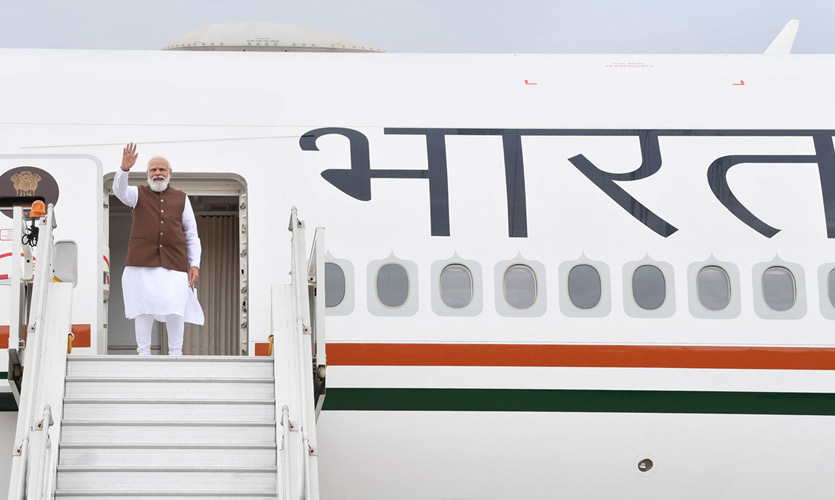Prime Minister Narendra Modi departed for his much awaited three-day visit to the US on Wednesday to participate in the first ever face to face meeting with the leaders of the Quadrilateral Security Dialogue (Quad), a multilateral group involving Australia, India, Japan and the US. He is also expected to address a high level international meeting at the 76th session of the United Nations General Assembly (UNGA), as well as attend a bilateral meeting with US President Joe Biden at the White House.
Before leaving for his visit to the US, PM Modi said that his visit was an “occasion to strengthen strategic partnership with the US and consolidate ties with Japan and Australia”.
“During my visit to the US between September 22-25, I will review India-US Comprehensive Global Strategic Partnership with President Joe Biden and exchange views on regional and global issues of mutual interest,” said PM Modi.
The world is looking forward to finding lasting solutions for COVID-19, climate change, the prevailing deleterious situation in Afghanistan post the withdrawal of American troops, China’s increasing dominance in the Indo-Pacific region, terrorism and extremism, the dilemma in the Middle East and African countries and so on. The scheduled summit of world leaders will aim to lay a path towards peace and prosperity if everything goes well in lieu of international peace and order.
The meeting between PM Modi and President Biden will mark the first ever face to face interaction between the two international leaders since the latter assumed office. The key focus of the prime minister’s visit will be the bilateral meeting with Biden, participation in the Quad summit and addressing the UNGA, along with some business interactions.
As per the schedule, PM Modi will meet with President Biden on September 24 at the White House to discuss the security concerns following the troops’ withdrawal from Afghanistan. Along with this, there will be key focus on the issues of terrorism and radicalism. Foreign Secretary Harsh V. Shringla said that the two leaders would discuss the need to “stem radicalism, extremism, cross-border terrorism and dismantling of global terrorist network”. The leaders will also discuss ways to enhance the India-US relations in the realm of defence, trade and energy.
Later that day, PM Modi will host the first in-person Quad leaders’ summit, which will be attended by Australian Prime Minister Scott Morrison, Japanese Prime Minister Yoshihide Suga, and President Biden. In lieu of the summit, PM Modi is likely to meet US Vice President Kamala Harris and also hold a top level meeting with top American business tycoons in order to expand India’s ties with the US in the domain of trade and investments, as part of India’s post-COVID recovery actions.
During the first ever face to face Quad summit, the four leaders are likely to discuss the situation in South Asia after the fall of Kabul and the emerging security concerns. They will also focus on the situation in the Indo-Pacific region amidst China’s intimidating actions. As per reports, there will also be a discussion on how to contain the deadly COVID-19 pandemic, evolve a common approach to emerging technologies, and address climate change.
Besides taking forward the vaccine partnership unveiled in the month of March at the first virtual Quad summit when the world was witnessing an extreme shortage of vaccine supply, New Delhi is expecting collaboration and cooperation from the leaders in the areas of defence and technological advancements, and means to ensure a free and open Indo-Pacific against China’s intimidating actions and its expansionist policy in the South China Sea.
PM Modi will be accompanied by a high-level delegation including External Affairs Minister S. Jaishankar, who is already in the US, and National Security Advisor Ajit Doval.
PM Modi will address the 76th session of the UNGA on September 25 in New York. The theme for this year’s General Debate is, ‘Building Resilience through hope to recover from COVID-19, rebuild sustainably, respond to the needs of the planet, respect the rights of people and revitalise the United Nations’.
India’s Permanent Representative to the UN, Ambassador T.S. Tirumurti underscored that the issues of COVID-19 and the emerging developments in Afghanistan are likely to dominate the assembly discussion.
“(The) 76th UNGA is an important occasion for India for many reasons. There is an expectation that India, as the leading voice of the developing world as well as the current member of the UN Security Council, will use its voice to take up global issues forcefully. They include climate change, Sustainable Development Goals, equitable and affordable access to vaccines, poverty eradication and economic recovery, women’s empowerment and participation in governance structures, terrorism, peacekeeping, peacebuilding, Indo-Pacific and UN reforms. We will certainly do so, as we have indeed done so before as well,” said Ambassador Tirumurti.
Apart from that, India will participate in three high-level meetings organised by UN Secretary-General Antonio Guterres on Climate, Energy and Food Systems. The UN stated that the roundtable “will be a chance for national leaders to demonstrate solidarity and ambition to keep the world’s 1.5ºC temperature goal within reach”.
It will be interesting to see how China will analyse and react to the statements issued by New Delhi and its allies, including the Quad members. China is being seen as the biggest threat in the Indo-Pacific region, an arch rival of India and the US, and has been at the forefront of helping and aiding the so called Islamic Emirate of Afghanistan ruled by the hardliner Taliban. Apart from this, the recently finalised AUKUS deal between Australia, the UK and the US will allow the latter two countries to provide eight nuclear submarines to Australia. China has denounced the deal, accusing the countries of promoting an arms race and terming it a threat to tranquillity in the region.










